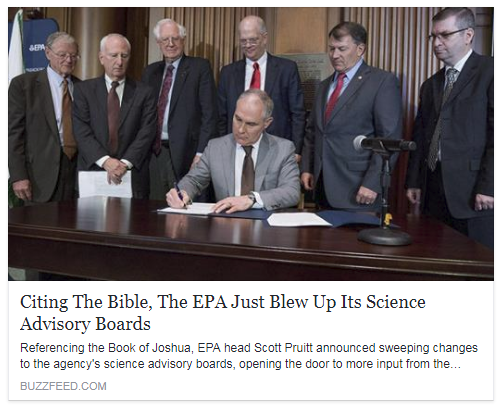File:Pruitt's EPA.png
Pruitt's_EPA.png (502 × 406 pixels, file size: 226 KB, MIME type: image/png)
<addthis />
"Choose this day whom you are going to serve"
The Environmental Protection Agency announced on Tuesday afternoon (Oct 31st) sweeping changes to who can advise the agency on its research and regulatory priorities, opening the door to more industry participation.
Effective immediately, scientists who receive EPA funding cannot serve on the agency's three major advisory groups. Some Republican lawmakers have been pushing for similar changes to the agency's advisory boards for years.
"We want to ensure that there’s integrity in the process and that the scientists that are advising us are doing so without any type of appearance of conflict of interest," EPA head Scott Pruitt said at a press conference announcing the directive.
Pruitt used a story from the Book of Joshua to help explain the new policy.
On the journey to the promised land, "Joshua says to the people of Israel: choose this day whom you are going to serve," Pruitt said. "This is sort of like the Joshua principle — that as it relates to grants from this agency, you are going to have to choose either service on the committee to provide counsel to us in an independent fashion or chose the grant. But you can’t do both. That’s the fair and great thing to do."
A large coalition of science organizations, science advocates, environmentalists, and politicians lined up in fierce opposition to the policy changes, arguing the rules not only disqualify top environmental and health researchers from advising but also favor scientists paid for by EPA-regulated companies. They also have pointed out that EPA has strict rules in place for disclosing any conflicts of interest.
"Frankly, this directive is nuts," Al Teich of George Washington University wrote in an email to BuzzFeed News.
"There is an important role for citizen advisors who are not experts in a scientific field and who represent various constituencies on advisory committees," wrote Teich, a research professor of science, technology, and international affairs. "But they should complement, not replace the experts. Disqualifying the very people who know the most about a subject from serving as advisors makes no sense."
The change calls into question EPA's ability to protect the country, according to Rush Holt, chief executive officer of the American Association for the Advancement of Science. "We question whether the EPA can continue to pursue its core mission to protect human health and the environment..."
○
File history
Click on a date/time to view the file as it appeared at that time.
| Date/Time | Thumbnail | Dimensions | User | Comment | |
|---|---|---|---|---|---|
| current | 14:13, 1 November 2017 |  | 502 × 406 (226 KB) | Siterunner (talk | contribs) |
You cannot overwrite this file.
File usage
The following 2 pages use this file:
